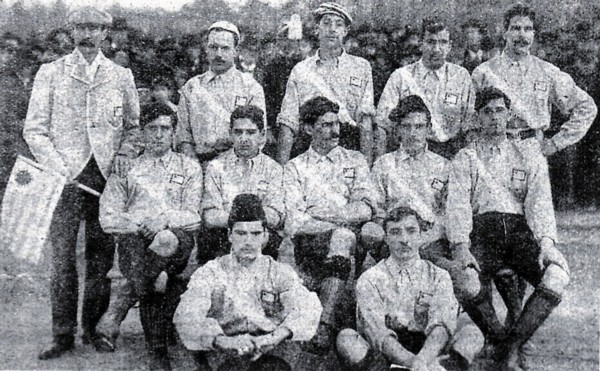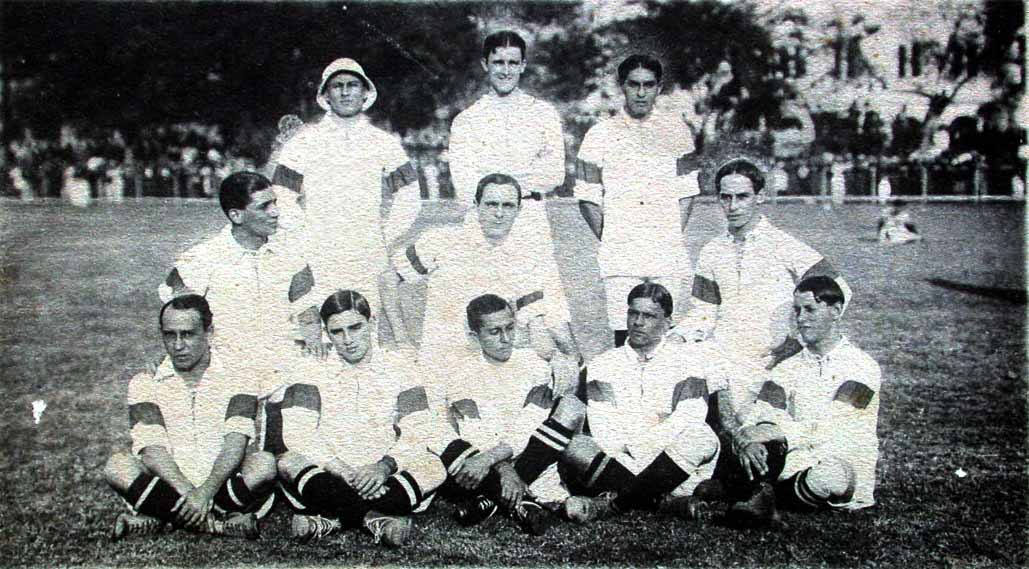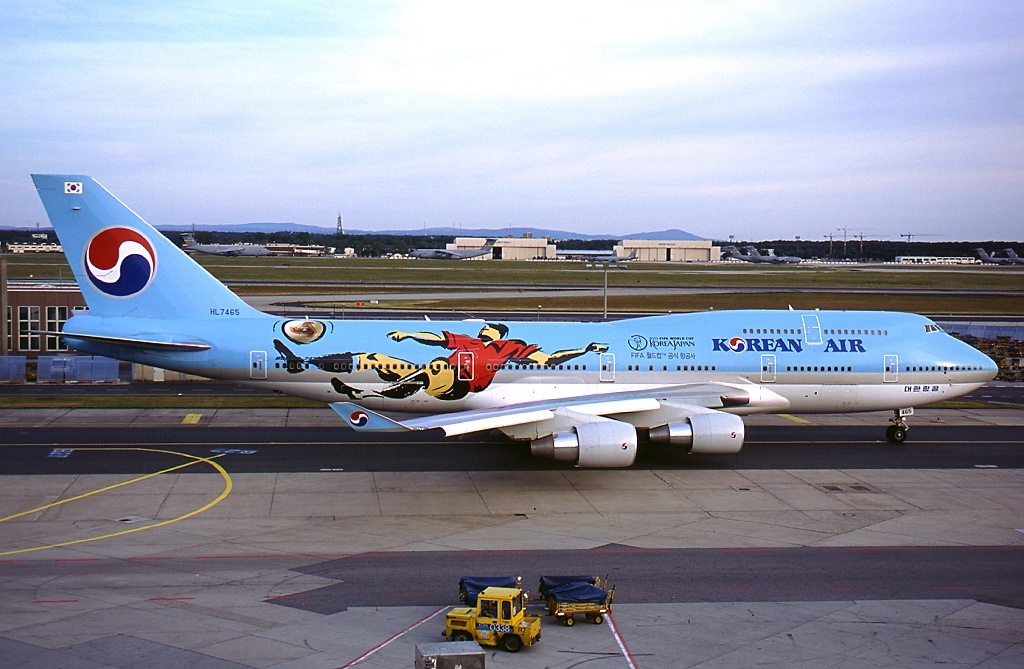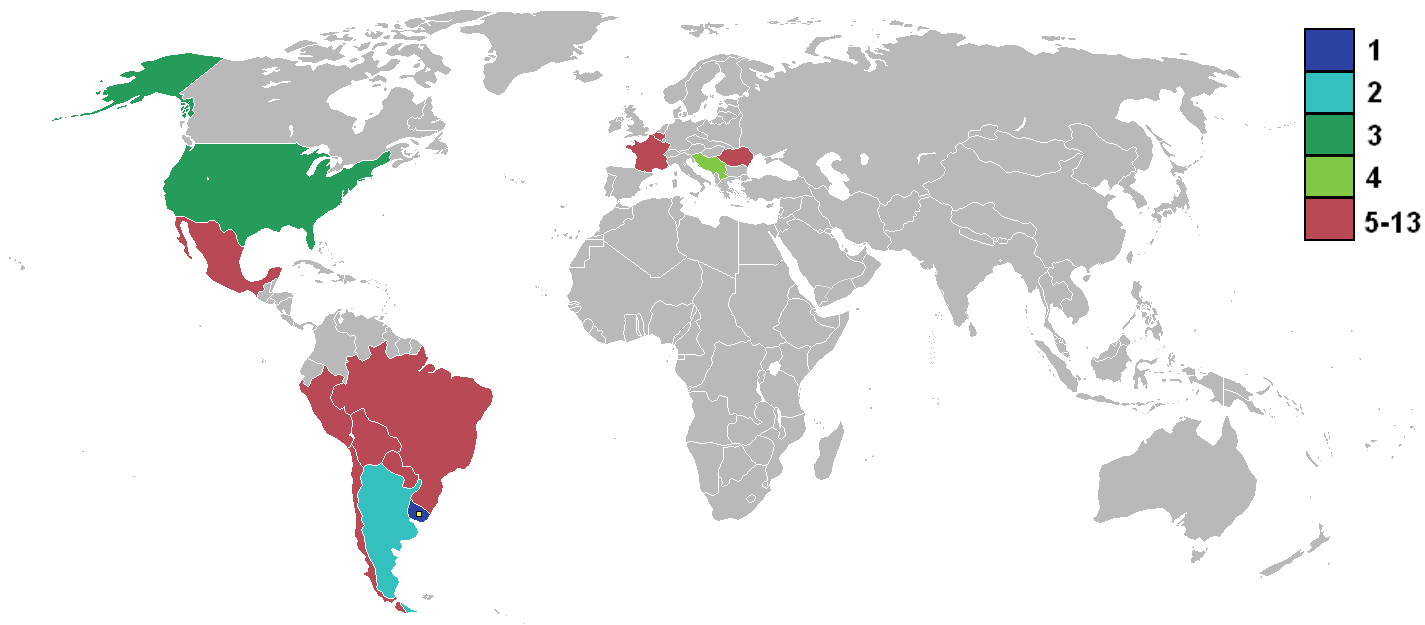|
Ecuador National Football Team
The Ecuador national football team ( es, Selección de fútbol de Ecuador) represents Ecuador in men's international football and is controlled by the Ecuadorian Football Federation (FEF). They joined FIFA in 1926 and CONMEBOL a year later. Discarding an invitation to participate in the inaugural FIFA World Cup held in Uruguay, Ecuador did not make their tournament debut until 2002. After finishing above Brazil and Uruguay in the standings, the qualifying campaign marked the emergence of several players, such as Agustín Delgado, Álex Aguinaga, Iván Hurtado, Ulises de la Cruz and Iván Kaviedes, who would set the stage for Ecuador's achievements in the next decade. Having reached the Round of 16 in a memorable 2006 World Cup campaign, they were expected to deliver at the 2007 Copa América but were eliminated in the group stage. Along with Venezuela, they have not won the continental tournament. ''La Tri''s best performance was fourth in 1959 and 1993, both times on home ... [...More Info...] [...Related Items...] OR: [Wikipedia] [Google] [Baidu] |
Ecuadorian Football Federation
The Ecuadorian Football Federation ( es, Federación Ecuatoriana de Fútbol or ) is the governing body of football in Ecuador. Its headquarters are in Quito, and it organizes the country's various football competitions and oversees the Ecuador national team. History Numerous amateur federations sprouted in the provinces with the largest cities, being Quito, and Guayaquil. Seeking to unify and compete against each federation, the Football Federation was created on May 30, 1925, known as Association of Ecuadorian Football. In 1926, the federation hosted its first organized competition the Riobamba Olimpic, and became FIFA affiliated. In 1927 it formally joined CONMEBOL, but debuted in competition in 1939 in the South American Championship. In the 1940s the FEF, hosted the first amateur competitions of each provincial selective nationwide. By the 1950s Guayas, and Pichincha, left behind amateur, and became professional 1951, and 1953 respectfully. By 1957, now ready the FEF bega ... [...More Info...] [...Related Items...] OR: [Wikipedia] [Google] [Baidu] |
1993 Copa América
The 1993 Copa América was the 36th Copa América, CONMEBOL's football tournament for national teams. It was held in Ecuador between 15 June and 4 July. All 10 CONMEBOL members took part, but for the first time two nations from outside CONMEBOL were invited to take part in the tournament, to round out the format. Mexico and the United States, both of CONCACAF, were the invited teams for this tournament. Argentina defeated Mexico in the final 2–1 to win their record 14th continental championship, also their last senior title until 2021. It was the first edition of the Copa América in which neither Brazil nor Uruguay finished in the top four. b ... [...More Info...] [...Related Items...] OR: [Wikipedia] [Google] [Baidu] |
2007 Copa América
The 2007 Campeonato Sudamericano Copa América, known simply as the 2007 Copa América or 2007 Copa América Venezuela, was the 42nd edition of the Copa América, the South-American championship for international association football teams. The competition was organized by CONMEBOL, South America's football governing body, and was held between 26 June and 15 July in Venezuela, which hosted the tournament for the first time. The competition was won by Brazil (they were also the defending champions), who beat Argentina 3–0 in the final. Mexico took third place by beating Uruguay 3–1 in the third-place match. Brazil thus won the right to represent CONMEBOL at the 2009 FIFA Confederations Cup. Competing nations As with previous tournaments, all ten members of CONMEBOL participated in the competition. In order to bring the number of competing teams to twelve, CONMEBOL invited Mexico and the United States, the two highest ranking CONCACAF teams in the FIFA World Rankings. Just a ... [...More Info...] [...Related Items...] OR: [Wikipedia] [Google] [Baidu] |
Iván Kaviedes
Jaime Iván Kaviedes Llorenty (born 24 October 1977) is an Ecuadorian former professional footballer who played as a forward. Club career Kaviedes rose to fame after scoring 43 goals in one season for Emelec in the 1998 Ecuadorian league. This led to a move to Perugia in the Italian Serie A. Kaviedes was unsuccessful there, since then he has journeyed around the world playing for a number of clubs in Europe, Mexico, and South America, even returning to his homeland. After a brief spell in Deportivo Quito, Kaviedes signed with Premier League club Crystal Palace, and became the third Ecuadorian to play in the Premier League. He arrived at the club for a reported fee of reputedly £2 million, though there was confusion over whether he was signed on loan or on a full transfer. However, Kaviedes did not fit into Crystal Palace or with Manager Iain Dowie's 4–5–1 formation. He was transferred out of the club in the 2004–05 winter transfer window. After the 2006 FIFA World Cup ... [...More Info...] [...Related Items...] OR: [Wikipedia] [Google] [Baidu] |
Ulises De La Cruz
Ulises Hernán de la Cruz Bernardo (born 8 February 1974 in Piquiucho, Carchi Province, Carchi) is a retired Ecuadorian association football, footballer, who since 2013 has been a member of his country's National Assembly for the governing PAIS Alliance. A Defender (association football), defender, he played 101 times for the Ecuador national football team between 1995 and 2010, and was selected for two FIFA World Cup tournaments. He spent his club career at Sociedad Deportivo Quito, Deportivo Quito, Barcelona Sporting Club, Barcelona S.C., Sociedad Deportiva Aucas, Aucas, Cruzeiro Esporte Clube, Cruzeiro, Hibernian F.C., Hibernian, Aston Villa F.C., Aston Villa, Reading F.C., Reading and Birmingham City F.C., Birmingham City. De la Cruz has set up a charity, Friends of FundeCruz, in his home village to fund a number of projects serving the local community. Club career Early career De la Cruz's first team was the Ecuadorian side Sociedad Deportivo Quito, for whom he star ... [...More Info...] [...Related Items...] OR: [Wikipedia] [Google] [Baidu] |
Álex Aguinaga
Álex Dario Aguinaga Garzón (, born 9 July 1969) is an Ecuadorian former professional football player and manager. A midfielder during his playing career, he is one of the all-time cap leaders for Ecuador with 109 matches, scoring 23 goals. Aguinaga is known as one of the best Ecuadorian footballers of all time. On the club level, Aguinaga has played for Deportivo Quito, Necaxa, Cruz Azul and LDU Quito. Club career Necaxa Aguinaga spent the majority of his club career at Necaxa, whom he joined in 1989, winning 3 championships with the club. In 1999 Aguinaga was crucial for Necaxa's first CONCACAF Champions Cup title. Necaxa would go on to participate in the first edition of the FIFA Club World Cup where in the group stage Aguinaga scored against Vasco da Gama, but missed a penalty against Manchester United. He scored in the penalty shootout against Real Madrid in the 3rd place match. Aguinaga played for his country in the 2002 FIFA World Cup at the age of 32. He also holds a ... [...More Info...] [...Related Items...] OR: [Wikipedia] [Google] [Baidu] |
Agustín Delgado
Agustín Javier Delgado Chalá (born 23 December 1974) is an Ecuadorian former professional footballer who played as a forward. Nicknamed ''Tín'', he was the all-time top scorer for the Ecuador national team with 31 goals in 71 games before being overtaken by Enner Valencia. Delgado played professional club football in Ecuador, Mexico and England. Club career Early career Delgado started his career in his native Ecuador with ESPOLI in 1991 before joining Barcelona SC in 1994, where he played for one year, winning the Ecuadorian Serie A in 1995. He then joined El Nacional and again won the Ecuadorian league title, before returning to Barcelona and securing a third consecutive league winner's medal. In 1998, Delgado moved to Mexico where he had a brief spell at Cruz Azul. He joined CONCACAF champions Necaxa in 1999 and represented the club at the 2000 FIFA Club World Championship, scoring against South Melbourne in the group stage, and in the third-place play-off agains ... [...More Info...] [...Related Items...] OR: [Wikipedia] [Google] [Baidu] |
Uruguay National Football Team
The Uruguay national football team ( es, Selección de fútbol de Uruguay) represents Uruguay in international Association football, football, and is controlled by the Uruguayan Football Association, the governing body for football in Uruguay. The Uruguayan team is commonly referred to as ''La Celeste'' (The Sky Blue). Regarded to be one of the greatest footballing nations of all time, Uruguay has won the Copa América 15 times being tied with Argentina for the most titles in the history of the tournament. Uruguay won their most recent title in 2011 Copa América, 2011. Additionally, Uruguay are the holders of Four stars above Uruguay's football crest, four FIFA World Championships: The team has won the FIFA World Cup twice, including the first World Cup in 1930 FIFA World Cup, 1930 as hosts, defeating Argentina 4–2 in the final. Their second title came in 1950 FIFA World Cup, 1950, upsetting host Brazil 2–1 in the final match, which had the highest attendance for a football ... [...More Info...] [...Related Items...] OR: [Wikipedia] [Google] [Baidu] |
Brazil National Football Team
The Brazil national football team ( pt, Seleção Brasileira de Futebol), nicknamed ''Seleção Canarinho'' (‘Canary Squad’, after their bright yellow jersey), represents Brazil in men's international football and is administered by the Brazilian Football Confederation (CBF), the governing body for football in Brazil. They have been a member of FIFA since 1923 and a member of CONMEBOL since 1916. Brazil is the most successful national team in the FIFA World Cup, being crowned winner five times: 1958, 1962, 1970, 1994 and 2002. The ''Seleção'' also has the best overall performance in the World Cup competition, both in proportional and absolute terms, with a record of 76 victories in 114 matches played, 129 goal difference, 247 points, and 19 losses. It is the only national team to have played in all World Cup editions without any absence nor need for playoffs, and the only team to have won the World Cup in four different continents: once in Europe ( 1958 Sweden), ... [...More Info...] [...Related Items...] OR: [Wikipedia] [Google] [Baidu] |
2002 FIFA World Cup
The 2002 FIFA World Cup, also branded as Korea Japan 2002, was the 17th FIFA World Cup, the quadrennial Association football, football world championship for List of men's national association football teams, men's national teams organized by FIFA. It was held from 31 May to 30 June 2002 at sites in South Korea and Japan, with its 2002 FIFA World Cup Final, final match hosted by Japan at Nissan Stadium (Yokohama), International Stadium in Yokohama. A field of 32 teams qualified for this World Cup, which was the first to be held in Asia, the first to be held outside of the Americas or Europe, as well as the first to be jointly-hosted by more than one nation. China national football team, China, Ecuador national football team, Ecuador, Senegal national football team, Senegal, and Slovenia national football team, Slovenia made their World Cup debuts. The tournament had several upsets and surprise results, which included the defending champions France national football team, Franc ... [...More Info...] [...Related Items...] OR: [Wikipedia] [Google] [Baidu] |
1930 FIFA World Cup
The 1930 FIFA World Cup was the inaugural FIFA World Cup, the world championship for men's national football teams. It took place in Uruguay from 13 to 30 July 1930. FIFA, football's international governing body, selected Uruguay as host nation, as the country would be celebrating the centenary of its first constitution and the Uruguay national football team had successfully retained their football title at the 1928 Summer Olympics. All matches were played in the Uruguayan capital, Montevideo, the majority at the Estadio Centenario, which was built for the tournament. Thirteen teams (seven from South America, four from Europe, and two from North America) entered the tournament. Only a few European teams chose to participate because of the difficulty of traveling to South America in the context of the Great Depression. The teams were divided into four groups, with the winner of each group progressing to the semi-finals. The first two World Cup matches took place simultaneously a ... [...More Info...] [...Related Items...] OR: [Wikipedia] [Google] [Baidu] |
FIFA
FIFA (; stands for ''Fédération Internationale de Football Association'' ( French), meaning International Association Football Federation ) is the international governing body of association football, beach football and futsal. It was founded in 1904 to oversee international competition among the national associations of Belgium, Denmark, France, Germany, the Netherlands, Spain, Sweden and Switzerland. Headquartered in Zürich, Switzerland, its membership now comprises 211 national associations. These national associations must each also be members of one of the six regional confederations into which the world is divided: CAF (Africa), AFC (Asia and Australia), UEFA (Europe), CONCACAF (North & Central America and the Caribbean), OFC (Oceania) and CONMEBOL (South America). FIFA outlines a number of objectives in the organizational Statutes, including growing association football internationally, providing efforts to ensure it is accessible to everyone, and advocating for ... [...More Info...] [...Related Items...] OR: [Wikipedia] [Google] [Baidu] |
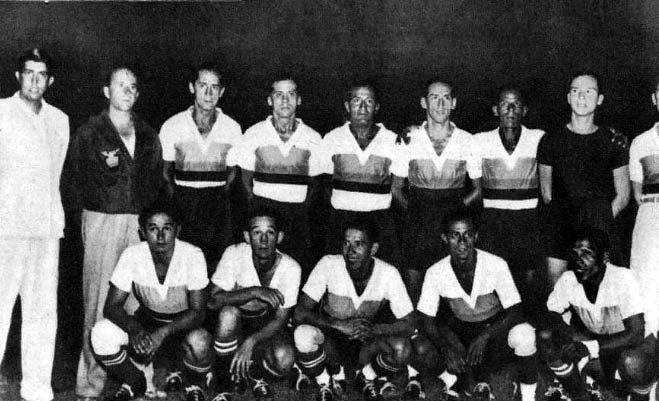
.jpg)

